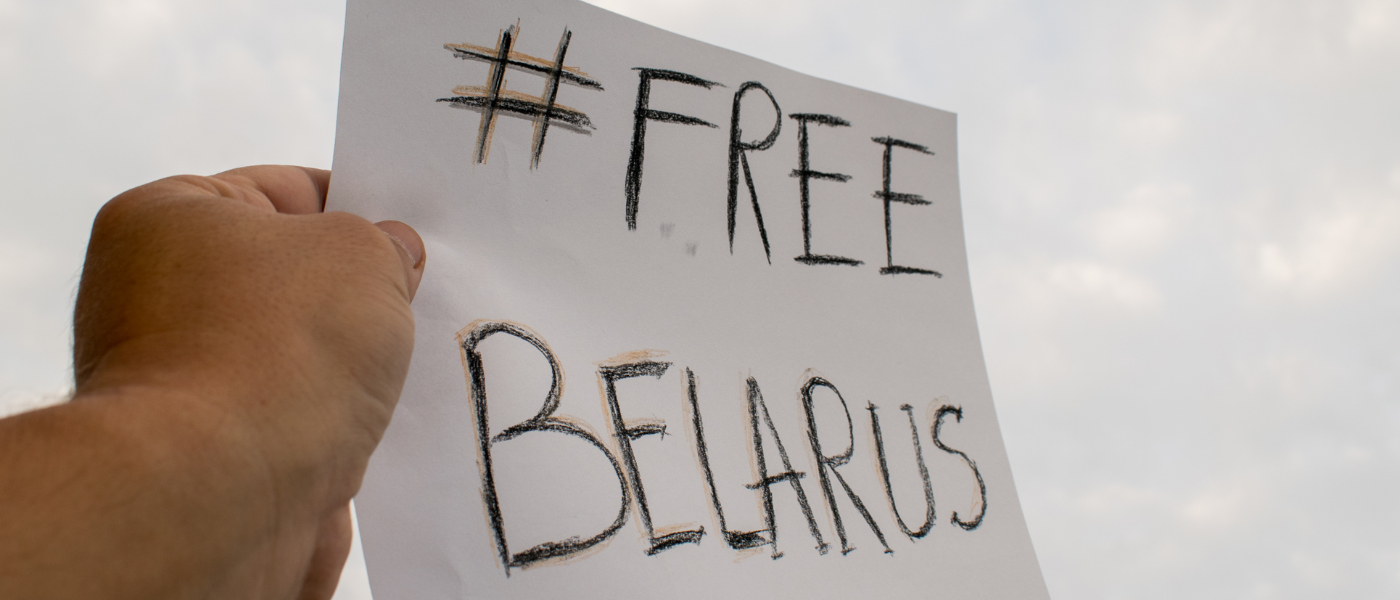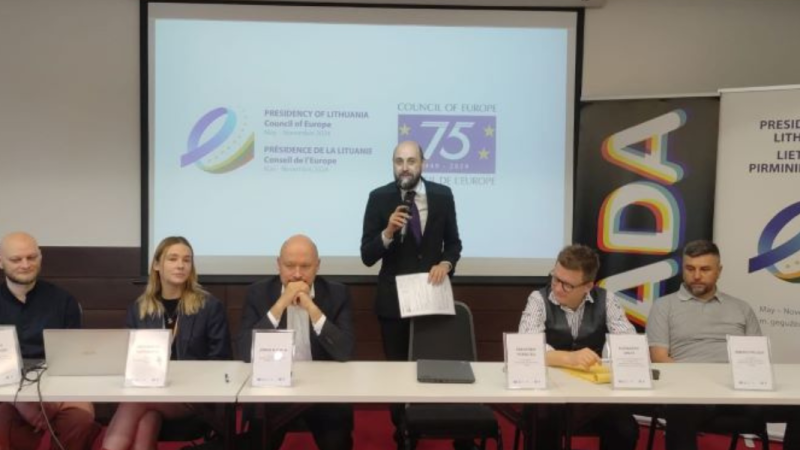Situation of freedom of association and civil society organisations in Belarus October 2023

Repressions in Belarus continue without interruption: detentions, searches, summonses for interviews, signatures on non-disclosure, the inclusion of Belarusians in the lists of those involved in extremist and terrorist activities, and other types of persecution.
Sometimes only the intensity of one or another form of pressure changes. Thus, during the monitoring period, due to the entry into force of the legislation on the necessity to notify about citizenship or residence permit of another country, checks at the border for the presence of a residence permit of a foreign state became more frequent. Even though the process of liquidation of NGOs in Belarus has slightly slowed down, it continues and the number of NGOs liquidated in Belarus is increasing. As of the end of September 2023, no less than 931 non-governmental organizations are in the process of forced liquidation, either through lawsuits filed for compulsory dissolution in court or by being forcibly removed from the Unified State Register of Legal Entities and Individual Entrepreneurs (USR). The number of organizations that decided on self-liquidation is at least 526 as of the end of October. Having cleaned up public associations, foundations, non-state institutions, trade unions, and opposition political parties registered in Belarus, the authorities took up religious organizations. In October the Religious Community of Full Gospel Christians «New Life Church» was liquidated. A new version of the law «On Freedom of Conscience and Religious Organizations» was adopted in the first reading, which provides for the re-registration of all religious associations and organizations in Belarus. Consequently, the losses in Belarus’s civil sector since the post-election period of 2020 amount to no less than 1,457 institutionalized forms of non-governmental organizations, including civic associations, professional unions, political parties, foundations, non-governmental institutions, and associations. Amendments to the Law on Local Governance and Self-Government came into force, providing for budgetary funding of civic initiatives, including those operating in an unregistered status.
As of October 31, 2023, there are 1473 people recognized as political prisoners in Belarus, currently held in places of detention.
Forced liquidation of non-governmental organizations[1]
Due to the forced liquidation of almost a thousand non-governmental organizations in Belarus, the process of liquidation of NGOs in Belarus has slowed down a bit. However, this process continues and the number of NGOs liquidated in Belarus continues to increase.
As of October 31, 2023, according to the monitoring conducted by Lawtrend, there have been 931 NGOs in the process of forced liquidation, including lawsuits filed by registering authorities for liquidation or being forcibly excluded from the Unified State Register of Legal Entities and Individual Entrepreneurs (USR).
Non-governmental organizations deciding on self-liquidation
The process of NGOs independently deciding on liquidation continues. As of October 31, 2023, according to the monitoring conducted by Lawtrend, there have been 526 NGOs (public associations, foundations, and institutions) in which the authorized body or founders have decided to liquidate.
As before, the decision on self-liquidation is primarily due to pressure on the members and employees of NGOs, an unfavourable legal environment, the overall socio-political situation in the country, and often the authorities’ pressure on NGOs to make such a decision.
Religious organizations: forced liquidation, impending re-registration, other forms of pressure.
On 17 October Minsk City Court ruled to liquidate the Religious Community of Full Gospel Christians «New Life Church». As a reason for the liquidation of the Protestant church the Minsk City Executive Committee stated that it was carrying out extremist activities and, accordingly, violating the law «On Freedom of Conscience and Religious Organizations».
The decision to liquidate a religious community, as in many cases of forced liquidation of public associations, trade unions and other non-profit organizations, is one method among several other methods of pressure on a particular organization and its supporters.
Thus, on 20 June 2023, the building of the New Life Church in Minsk was destroyed by the decision of the state structures. By the decision of the court of the Central district of Minsk on 23 August the page «New Life» on Instagram and the video under the title «Position of Christians of the church «New Life» on the YouTube channel of the church, by the decision of the Maladzyechna district court of Minsk region of 28 August the Facebook page and Telegram-channel of the church, by the decision of the Maladzyechna district court of Minsk region of 31 August the page of the church in the VK social network were included in the «Republican list of extremist materials«.
The pastor of the church, Vyachaslau Hancharenka, has been detained by police on several occasions: in August 2023 and September 2022. According to monitoring data by «Christian Vision», as of 11 October 2023, at least 60 priests suffered due to political persecution «during the crisis in Belarus».
On 11 October, the draft law «On amending laws on the activities of religious organizations» was adopted in the first reading, setting out a new version of the law «On Freedom of Conscience and Religious Organizations».
The draft law proposes to introduce prohibitive norms regarding the use in places designated for religious services of any symbols other than religious symbols, as well as literature and images that propagate war, call for racial hostility, and hostility on religious or national grounds. The draft law proposes a ban on the participation of religious organizations in political activity and the activities of political parties. Provisions are envisaged to allow religious organizations to establish legal entities or structural subdivisions that will be able to provide social services to certain categories of citizens. The draft law specifies the procedure for establishing and registering a religious organization and the requirements for its founders. The list of grounds for the liquidation of religious organizations is expanded. Such grounds include inter alia, activities of a religious organization that contradict the main directions of domestic and foreign policy of the state, aimed at discrediting the Republic of Belarus, propaganda of war, social, national, religious, racial enmity, other extremist activities, humiliation of national honour and dignity. The draft law also introduces several amendments concerning property relations of religious organizations in terms of the use of their immovable and other property.
The draft law also establishes mandatory re-registration for religious organizations. Religious organizations will be obliged within one year after the new version of the law comes into force to bring their charters in compliance with it and apply to the registration authorities for re-registration or make a decision on liquidation. Religious organizations that have not been re-registered and have not made a decision on liquidation are subject to liquidation by decision of the regional (Minsk city) court at the location of the religious organization at the request of the Commissioner for Religious and Ethnic Affairs, regional and Minsk city executive committees.
The usage of anti-extremism legislation as a form of pressure on organizations of the civil society
The practice of recognising information products, including initiatives posted abroad, as «extremist materials», expanding the lists of citizens, organizations, formations and individual entrepreneurs involved in extremist activities, and bringing citizens to criminal responsibility for allegedly financing extremist activities: transferring donations (donations) to various foundations and organizing and participating in extremist formations, has not stopped.
According to the Ministry of Internal Affairs, based on the materials of operatives of the Main Directorate for Combating Organized Crime and Corruption, a criminal case was initiated against the participants of the live broadcast «Online marathon of solidarity with political prisoners «We do care». Investigators opened a criminal case under Article 3612 of the Criminal Code for financing extremist activity (the sanction of the article provides for up to 8 years of imprisonment). The persons involved in the financing of extremism in Belarus and abroad are being identified.
Earlier, the court of the Central district of Minsk recognized the video content «We Do Care» as extremist material.
According to the Prosecutor General’s Office, in the course of supervision over the implementation of legislation on countering extremism, the Prosecutor General’s Office opened criminal proceedings against so-called the unlawful activities of the pro-Nazi extremist formation «The Council of the Belarusian People’s Republic» (Rada BNR). Criminal proceedings were instituted on the grounds of several offences under, inter alia, part 1 of article 3611 of the Criminal Code (leading an extremist formation, as well as a formation whose activities are aimed at rehabilitating Nazism, or participation in it); part 2 of article 3614 of the Criminal Code (involvement in extremist activities and other assistance to such activities committed by a group of persons); part 1 of article 130 of the Criminal Code (incitement of national, religious or other social enmity or discord committed by a group of persons).
The criminal cases were sent to the Chairman of the State Security Committee to organize a preliminary investigation and to identify all those involved in the activities of the said extremist formation (regardless of where they are: both abroad and on the territory of Belarus).
According to the Prosecutor General’s Office, even though Rada BNR was recognized as an extremist formation by the decision of the State Security Committee of Belarus (KGB) in July of this year, which its leaders and members were reliably aware of, they did not stop their illegal activities. Moreover, they have intensified it. For example, in September this year, elections for the new composition of the so-called «praesidium» of the Rada BNR were held, attracting new participants in illegal activities into their ranks.
Earlier, information products in various Internet resources of the Rada BNR were recognized as extremist materials.
During the monitoring period, the Tik-Tok accounts «Moladzevy Blok» (@moladzbel), «ZBS» (@zbsunion), «Politzek.me» (@politzek. me), Telegram channel «Viasna | Brest», the account of «PRASTORA KH» in the social network VK, the account in the social network «Instagram» community «volnyjaa» «Volnyja Initsyjatyva dapamohi volnym palitviaznyam Belarusi» (created in Lithuania), a group in the social network «Odnoklassniki» with the name «Coordination Council» were included to the List of the extremist materials.
By the decision of the KGB, the list of organizations, formations and individual entrepreneurs involved in extremist activities was supplemented with such formations as the Union of Mothers of Belarus and the Association of Belarusian Business Abroad.
Administrative and criminal prosecution of the leadership and members of civil society organizations, and activists.
Due to the performance of their professional activities, human rights defenders continue to serve prison sentences:
- the coordinator of Viasna Volunteer Service Marfa Rabkova (sentenced to 14 years and 9 months in a general regime colony, listed as involved in terrorist and extremist activities);
- Viasna volunteer Andrey Chapiuk (sentenced to 5 years and 9 months in a medium security prison, listed as involved in terrorist and extremist activities);
- Viasna chairman and Nobel laureate Ales Bialiatski; Viasna Board member and FIDH Vice-President Valiantsin Stefanovich;
- lawyer Uladzimir Labkovich, coordinator of the campaign «Human Rights Defenders for Free Elections»,
- human rights defender Nasta (Anastasiya) Loika (sentenced to seven years of imprisonment in a correctional colony of the general regime).
On 3 October the Supreme Court considered the appeal of human rights defender Nasta Loika: the verdict was left unchanged and the appeal was not satisfied. The State Security Committee (KGB) put the human rights defender on the list of those involved in terrorist activities.
In places of deprivation of liberty, other representatives of civil society organizations are also being held, for example,
- members of the Coordination Council Maxim Znak (included in the list of individuals involved in terrorist activities, sentenced to 10 years of imprisonment), Marya Kalesnikava (included in the list of individuals involved in terrorist activities, sentenced to 11 years of imprisonment),
- representative of the «Green Patrol» initiative Pavel Nazdra (included in the list of individuals involved in extremist activities, sentenced to 2 years of imprisonment),
- public figure, founder of the «Flying University» Uladzimir Matskevich (included in the list of individuals involved in extremist activities, sentenced to 5 years of imprisonment),
- expert of the analytical group of the Agency for Humanitarian Technologies, coordinator of the «Flying University,» senior analyst at the Center for European Transformation Tatsiana Vadalazhskaya (included in the list of individuals involved in extremist activities, sentenced to 2 years and 6 months of restricted freedom with placement in an open-type correctional facility («chemistry»)),
- member of the Council and co-founder of the School of Young Public Administration Managers Sympa, expert of the research project bipart Tatsiana Kuzina (sentenced to 10 years of imprisonment),
- founder and editor of the expert community website «Our Opinion,» head of the expert monitoring group «Belarus in Focus» Valeryia Kastsiuhova (sentenced to 10 years of imprisonment),
- co-chair of the association «Tell the Truth», and former presidential candidate Andrey Dzmitryeu (included in the list of individuals involved in extremist activities, sentenced to 1.5 years in a colony),
- founder of Symbal.by, Pavel Belavus, has been included in the lists of individuals involved in terrorist and extremist activities and has been sentenced to 13 years in a high-security correctional facility,
- art manager Uladzimir Bulauski has been included in the list of individuals involved in extremist activities and has been sentenced to 2 years in a general regime colony,
- former leader of the crowdfunding platforms Ulej and MolaMola, Eduard Babaryka, has been sentenced to 8 years in a high-security colony.
- Pavel Mazheika, a cultural figure and Hrodna activist who headed the «City Life Center,» has been sentenced to six years of imprisonment in a high-security colony.
According to the Belarusian Independent Trade Union, currently, nearly four dozen trade union activists and leaders of democratic trade unions are imprisoned in Belarus. Thus, leaders and activists of Belarusian independent trade unions are being held in places of detention:
- Aliaksandr Yarashuk, Chairman of the Belarusian Congress of Democratic Trade Unions (sentenced to 4 years of imprisonment, included in the list of individuals involved in extremist activities).
- Andrey Khanevich, Chairman of the primary organization of the Belarusian Independent Trade Union at OJSC «Hrodna Azot» (included in the list of individuals involved in extremist activities, sentenced to 5 years of imprisonment).
- Aliaksandr Mishuk, Chairman of the Independent Trade Union at «Belaruskali» (included in the list of individuals involved in terrorist activities and extremist activities, sentenced to 2 years and 6 months of imprisonment).
- Henadz Fiadynich, Head of the Independent Trade Union of Radioelectronics Industry Workers (sentenced to 9 years of imprisonment in high-security conditions, included in the list of individuals involved in extremist activities).
- Vasil Berasnieu, Leader of the Orsha Independent Trade Union of Radioelectronics Industry Workers, acting Chairman of the Trade Union of Radioelectronics Industry Workers (sentenced to 9 years of imprisonment in high-security conditions, included in the list of individuals involved in extremist activities). Vasil has serious health problems.
- Vatslau Areshka, Activist of the Trade Union of Radioelectronics Industry Workers (sentenced to 8 years of imprisonment, included in the list of individuals involved in extremist activities).
- Artsiom Zharnak, Chairman of the primary trade union organization of the Free Metalworkers Union at MAZ (included in the list of individuals involved in terrorist activities, sentenced to 4 years of imprisonment).
- Maksim Senik, Activist of the Belarusian Independent Trade Union at OJSC «Hrodna Azot» (sentenced to 4 years of imprisonment).
Mikhail Hromau, Secretary of the liquidated Free Metalworkers Union was sentenced to 2 years and 6 months of restricted freedom without placement in an open-type correctional facility (probation / «home chemistry»).
Vital Chychmarou, Head of the primary trade union organization of the Free Metalworkers Union was sentenced to 3 years of restricted freedom without placement in an open-type correctional facility (probation / «home chemistry»).
On October 31st , former deputy chairman of the Belarusian Congress of Democratic Trade Unions Siarhei Antusevich was released after serving his full sentence (sentenced on 26.12.2022 to two years of imprisonment, included in the list of individuals involved in extremist activities).
On 18 October political prisoner activist Dzmitry Dashkevich, who was supposed to be released when his term expired on 11 July 2023, was detained in a new criminal case under Article 411 of the Criminal Code (malicious disobedience to the demands of the colony administration), was sentenced to another year in a high-security colony.
Budgetary funding for civic initiatives.
On 21 October amendments to the Law of the Republic of Belarus No. 281-Z of 12 July 2023 «On amending laws on local governance and self-government» came into force. A new article introduced into this law came into force — Article 361, regulating the issues of implementation of civic initiatives. It is defined that civic initiatives are activities aimed at improving the quality of life of the population living on the territory of the respective administrative-territorial unit or its part, including the improvement of public land areas of settlements, construction (construction, reconstruction, repair, restoration, improvement) of socially significant objects, general prevention of offences, prevention of injuries and deaths of citizens, as well as the solution of other issues of local significance.
The norm on the financing of civil initiatives was introduced into the law based on the Program of Social and Economic Development of Belarus for 2021-2025, approved by Presidential Decree No. 292 of 29.07.2021, according to which every local budget will be formed taking into account the initiatives of civil society.
Initiative (participatory) budgeting, as a mechanism for involving citizens in decisions on choosing priorities for budget spending, as well as subsequent public control over the spending of funds, is widespread in the world. Competitions for the financing of civic initiatives started to be held in practice in Belarus as early as 2021, before the adoption of the law. For example, in the Hrodna and Homielregions. In the absence of adopted legislative norms, regulations on the contest were developed. Thus, the law enshrines the system of support for civic initiatives that have already started to develop in practice, creating general norms of legal regulation in this area. Thus, the law contains norms on the initiators of a civic initiative, the procedure for submitting and the required information for financing a civic initiative at the local level. The procedure for their competitive selection is entrusted to be developed by regional level councils.
In a situation where there is mass persecution of people for their civic position and abuse of legal norms in this case, the introduction of provisions in the legislation to support civic initiatives on the ground, support for civic initiatives in practice is progressive, in this regard, the introduction of such legal norms has long been lobbied by civil society organizations. At the same time, in the situation of mass liquidation of NGOs, and pressure on activists, neither the law itself nor the current practice of implementing initiatives does not answer the question of how this mechanism will work in practice (for example, how public control will be exercised at different stages of this process).
It is also characteristic that the introduction into the legislation of the norm on the implementation and possibility of financing civil initiatives, including unregistered ones, took place against the background of the ban on the activities of unregistered organizations in Belarus and the return of criminal liability for the organization and participation in the activities of unregistered organizations. On 13 August 2005, the Ministry of Justice of the Republic of Belarus adopted Resolution No. 49 «On Some Issues of Establishment of Public Associations and their Unions (Associations)». It follows from the explanation of the Ministry of Justice that various «movements», «civic initiatives», «coalitions», etc., which are public associations or unions of public associations, created in the republic, should be registered by the established procedure. All established public associations and their unions (associations), including those established in the form of «movements», «civic initiatives», «coalitions», etc., must undergo state registration by the procedure provided for state registration of public associations and their unions (associations).
Source: lawtrend.org



